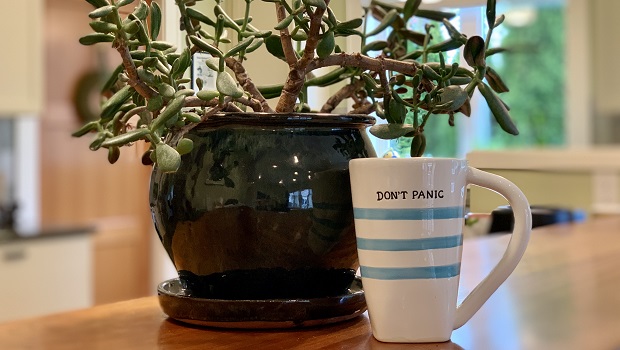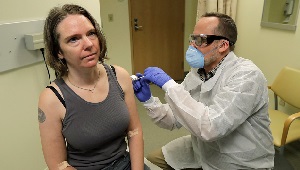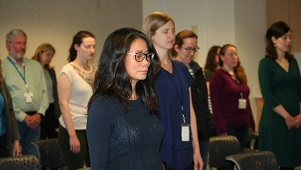Surviving an FFP: COVID-19

Dr. Jennifer McClure shares advice and resources for staying physically and emotionally well during the COVID-19 crisis, and beyond.
by Jennifer McClure, PhD, Clinical Psychologist, Senior Investigator and Director of Research, Faculty & Development, Kaiser Permanente Washington Health Research Institute
I don’t know about you, but this is my first pandemic. First experiences (or to borrow a phrase from author and researcher Dr. Brené Brown, FFT’s—F****ing First Times), are almost always scary, no matter what they are.
Do you recall your first day of school? Your first date? The first time you spoke in public, or the first time you brought your child home from the hospital? Inherently, these are not bad experiences, but they are universally scary because they represent the unknown. They cause us to question: How do I do this? What will happen next? Am I ready for what comes next? So, you can imagine the range of emotions and questions everyone is experiencing right now in response to COVID-19. We’re in unchartered territory and that can be scary, but there are positive and constructive steps we can all take to get through this FFP and come out the better for it.
Staying Mentally and Emotionally Healthy During a FFP
During the initial phase of any crisis, it’s common for people rise to the occasion and make heroic efforts to adapt and respond (“We got this!”), followed by a brief honeymoon phase during which people rally together (“We’re all in this together!”). I’m pleased to say this has been the response I’ve seen among my friends and colleagues in Washington state over the past 3 weeks, as we’ve all been asked to socially distance and re-engineer our daily lives to deter the spread of COVID-19.
But as a crisis goes on, which this one will continue to do for some time, emotional fatigue can set it and give way to more pervasive negative emotional reactions such as fear, anxiety, frustration, anger, mistrust, depression, guilt, paranoia, and panic. If left unchecked, these can quickly take a toll on individuals, families, and communities.
It’s important to recognize these negative emotions, name them, and own them. Once we do that, we can begin to re-assert control and deal with them. Below are some proven strategies to help you stay emotionally strong during this FFP:
- Be kind and compassionate with yourself and others. Remind yourself, we’re all doing the best we can under difficult circumstances, and we’re all going to get through this thing together. You can learn more about the health benefits of compassion in this article from the Greater Good Science Center at the University of California, Berkeley. If you would like to learn more about self-compassion, check out these great resources from Dr. Kristin Neff.
- Focus on the positive and practice gratitude. If you find your mind gravitating to thoughts that are distressing: stop, take a deep breath, and focus on something positive like listing all of the things you’re grateful for. Keeping a daily gratitude journal is another great coping strategy. You can learn more about the importance of gratitude in this article in Psychology Today.
- Learn to be more mindful and present. Research shows that being more mindful has positive mental and physical health benefits, including reduced stress, anxiety, burnout, chronic pain, and symptoms of chronic illness. Being mindful is also associated with improved focus and creativity, greater job satisfaction and engagement, increased stress resilience, and greater immune functioning. Cool, right? You can learn more about mindfulness and even access free online resources from Mindfulness Northwest.
- Limit your exposure to the news. It’s important to stay informed, but we live in an age of sensationalistic journalism and hyperbolic rhetoric. Choose your news sources wisely and consider limiting your daily dose. You might even consider taking regular vacation days from the news. Instead, focus on something that feeds your soul like art, music, reading, and spending time with loved ones.
- Give yourself extra time. Things are going to take longer right now. Don’t sweat it. Give yourself and others extra time to get things done.
- Stay socially connected, while physically distant. Call or email a friend or neighbor each day to check on their well-being. It’s a simple gesture, but it can mean a lot, especially to those who live alone or who are at high-risk if they get infected.
Incorporating these habits into your daily routine will not only aid your FFP survival, it can make you stronger and more emotionally resilient in the long run.
Staying Physically Healthy
Following the steps above can have positive emotional and physical health benefits. To stay physically healthy, it’s also important to follow the Centers for Disease Control’s advice for how to protect ourselves from infection with COVID-19 and practice healthy lifestyle habits during this time. That means getting plenty of rest (at least 7 hours a night), eating lots of healthy fruits and vegetables, getting daily exercise, and adhering to normal medical regimens.
Additional Resources
If you’re looking for additional tips and resources to add to your FFP survival kit, check out the following:
- FACE COVID-19 by Dr. Russ Harris is a great guide for coping during the pandemic which is grounded in the principles of Acceptance and Commitment Therapy. Dr. Harris has also produced a short, animated video.
- Anxiety Contagion: Tips for Relief, by Dr. Rachel Zoffness
- The Greater Good’s Guide to Well-Being During Coronavirus from the Greater Good Science Center at the University of California, Berkeley
healthy findings

Ask an epidemiologist: Where to learn about COVID-19
There’s much confusion about the new disease, but numbers don’t lie. The challenge is finding the right ones.
research

Kaiser Permanente launches first coronavirus vaccine trial
On March 16, 4 volunteers received an injection of an mRNA vaccine for COVID-19 in an NIH-funded trial in Seattle.
healthy findings blog

Mindfulness: Practicing what we preach (and study)
We don't just do research on mindfulness. We encourage our employees to practice it. Dr. Jennifer McClure explains.


